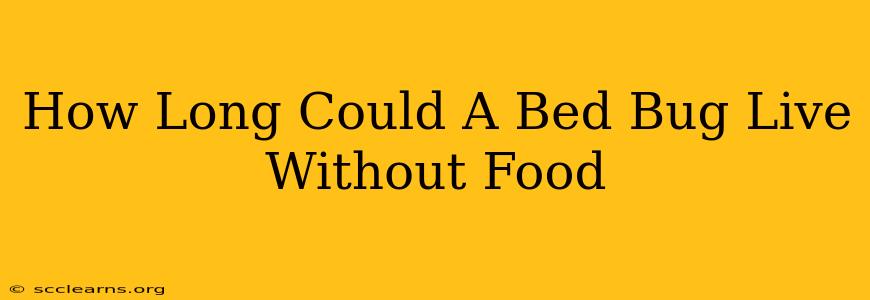Bed bugs are notorious pests, infesting homes and causing significant discomfort. One of the most frequently asked questions about these resilient insects is: how long can a bed bug live without a blood meal? The answer isn't straightforward, as several factors influence their survival. This post will explore the intricacies of bed bug starvation, helping you understand their tenacity and improve your pest control strategies.
The Lifespan of a Bed Bug: A Variable Equation
A bed bug's lifespan is surprisingly long, and its ability to survive without feeding is a crucial part of its success as a pest. Several factors impact their lifespan, including:
- Stage of development: Nymphs (immature bed bugs) require blood meals to molt and progress through their various instars (stages of development). Adult bed bugs can survive longer without feeding.
- Temperature and humidity: A consistently warm and humid environment will extend a bed bug's lifespan, while extreme temperatures can significantly shorten it.
- Access to water: While they need blood for sustenance, access to water can prolong their survival significantly, even without feeding.
How Long Can Adult Bed Bugs Survive Without Feeding?
Adult bed bugs are the most resilient. Under ideal conditions (moderate temperatures and humidity), an adult bed bug can survive for several months without feeding. Some studies suggest they can endure for up to a year under such conditions, although this is at the extreme end of the spectrum. However, it's crucial to remember that their activity and reproductive capabilities will drastically decrease during prolonged starvation.
The Impact of Starvation on Bed Bug Behavior
Starved bed bugs become more active in their search for a host, increasing the likelihood of bites and infestation spread. They become more susceptible to environmental stressors and are less likely to reproduce successfully.
How Long Can Nymphs Survive Without Feeding?
Nymphs are far more vulnerable to starvation than adults. They require regular blood meals to complete their molting process and reach maturity. A nymph's survival time without food is significantly shorter, usually only a few weeks. Without regular feeding, the nymph will likely die before reaching adulthood.
Practical Implications for Pest Control
Understanding bed bug starvation periods is crucial for effective pest control. While starvation alone won't eradicate an infestation, it can weaken the population, making treatment more effective. Combining starvation with other control methods, such as professional pest control treatments or thorough cleaning, offers the best chance of eliminating bed bugs from your home.
Other Factors Affecting Bed Bug Survival
Beyond food, other environmental factors influence bed bug survival:
- Temperature: Extreme temperatures (both hot and cold) will kill bed bugs.
- Humidity: Low humidity can desiccate (dry out) bed bugs, reducing their lifespan.
- Exposure to pesticides: Effective pesticide application will dramatically reduce bed bug survival rates.
Conclusion: Persistence and Prevention
While bed bugs can survive remarkably long periods without feeding, their resilience shouldn't be underestimated. A comprehensive pest control strategy that includes regular inspections, diligent cleaning, and professional treatment is the most effective way to prevent and eliminate bed bug infestations. Remember that early detection and prompt action are key to resolving a bed bug problem efficiently. Understanding their survival mechanisms empowers you to fight back effectively.

